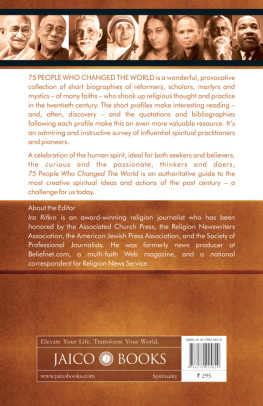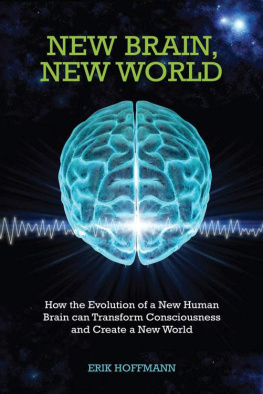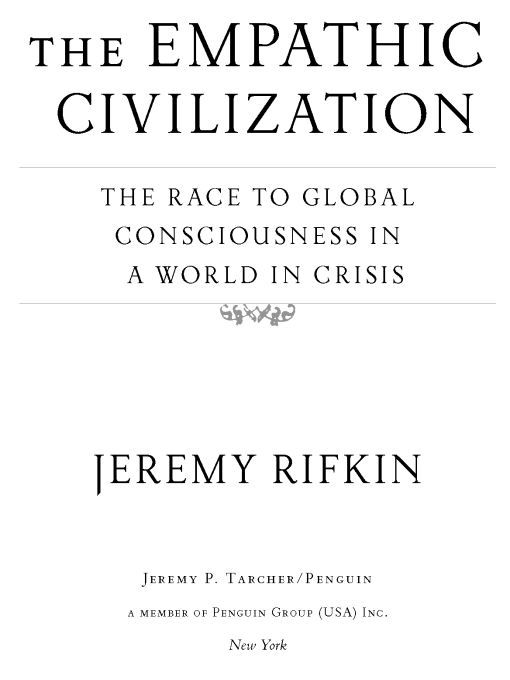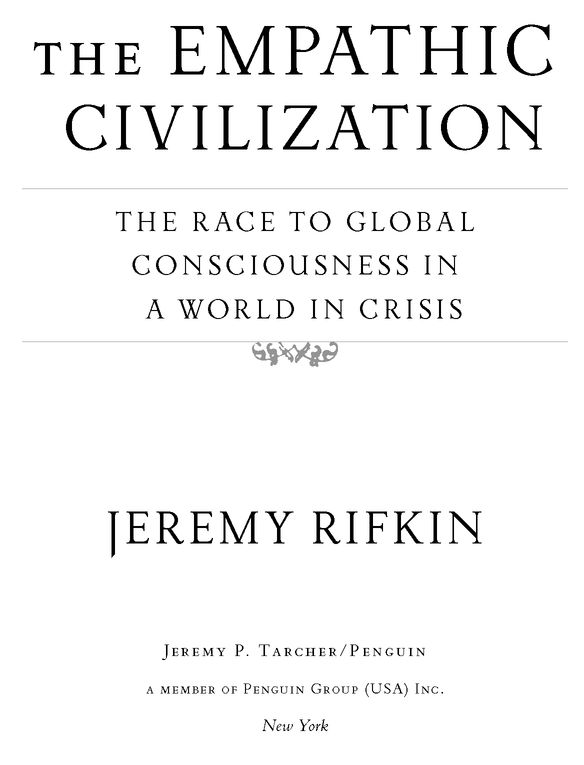Table of Contents
ALSO BY JEREMY RIFKIN
Common Sense II
Own Your Own Job
Who Should Play God?
(WITH TED HOWARD)
The Emerging Order
The North Will Rise Again
(WITH RANDY BARBER)
Entropy
(WITH TED HOWARD)
Algeny
Declaration of a Heretic
Time Wars
Biosphere Politics
Beyond Beef
Voting Green
(WITH CAROL GRUNEWALD)
The End of Work
The Biotech Century
The Age of Access
The Hydrogen Economy
The European Dream
January,1945
To all those who survived.
To all those who perished.
To all those yet to come.
To Carol Grunewald
ACKNOWLEDGMENTS
I WOULD LIKE to thank Lisa Friedberg for her outstanding work directing the research for the book. The research extended for more than a four-year period and involved thousands of source materials across every major academic discipline and professional field. Lisas extraordinary ability to locate vital information and coordinate and categorize the sheer volume of research at hand was instrumental in moving the project forward.
Thanks to Dr. Sally Wengrover for coordinating the final preparation of the book. Her keen eye for detail and extensive knowledge of many of the areas covered in the book were invaluable. Thanks also to the following research interns who contributed to the book: Deanna Cho, Juli Diamond, Kristina Dunphy, Daniel Frawley, Ashley Gold-wasser, Eric Hammerschmidt, Kara Horton, Adriane Javier, Jin-Young Kang, Alex Jue, Anirudh Khandelwal, Siddi Khara, Andrew Linowes, Georg Loeffl mann, Vijay Ramakrishnan, Cjay Roughgarden, Richard Savage, Erica Shapiro, Shivani Softa, Jenna Trebs, Marc Vincent, Miriam Weiss, and Comly Wilson.
Id like to extend my appreciation to Clara Mack for her help in preparing the resource material. Claras penchant for perfection helped facilitate the entire research process. I would like to thank Jennifer Lawrence and Nicholas Easley for their meticulous editorial assistance during the last several weeks of the project. Thanks to Drew Johnston and Angelo Consoli for their many contributions at various stages of the project. Thanks as well to Leda Scheintaub for her expert copyediting of the final manuscript. Id also like to thank my agent, Robert Barnett.
Id like to extend my warm gratitude to my old friend Jeremy Tarcher for making a place for me in his publishing fold over these many years, and to Joel Fotinos, my publisher, for his unswerving support, as well as to Lance Fitzgerald for ensuring a wide reading audience for my books around the world.
A very special thanks to my longtime editor, Mitch Horowitz, for his critical help in shaping the direction of the book. Our many fruitfuland enjoyableconversations over nearly half a decade were instrumental in honing the final manuscript.
Thanks to Tarcher/Penguin for generously allowing me to cite material from my previous books that were particularly apropos in advancing the themes in The Empathic Civilization.
Finally, thanks to my wife, Carol Grunewald, for the many spirited discussions of the critical themes and ideas that make up the heart of the book.
INTRODUCTION
This book presents a new interpretation of the history of civilization by looking at the empathic evolution of the human race and the profound ways it has shaped our development and will likely decide our fate as a species.
A radical new view of human nature is emerging in the biological and cognitive sciences and creating controversy in intellectual circles, the business community, and government. Recent discoveries in brain science and child development are forcing us to rethink the long-held belief that human beings are, by nature, aggressive, materialistic, utilitarian, and self- interested. The dawning realization that we are a fundamentally empathic species has profound and far- reaching consequences for society.
These new understandings of human nature open the door to a never-before-told journey. The pages that follow reveal the dramatic story of the development of human empathy from the rise of the great theological civilizations, to the ideological age that dominated the eighteenth and nineteenth centuries, the psychological era that characterized much of the twentieth century, and the emerging dramaturgical period of the twenty-first century.
Viewing economic history from an empathic lens allows us to uncover rich new strands of the human narrative that lay previously hidden. The result is a new social tapestryThe Empathic Civilizationwoven from a wide range of fields, including literature and the arts, theology, philosophy, anthropology, sociology, political science, psychology, and communications theory.
At the very core of the human story is the paradoxical relationship between empathy and entropy. Throughout history new energy regimes have converged with new communication revolutions, creating ever more complex societies. More technologically advanced civilizations, in turn, have brought diverse people together, heightened empathic sensitivity, and expanded human consciousness. But these increasingly more complicated milieus require more extensive energy use and speed us toward resource depletion.
The irony is that our growing empathic awareness has been made possible by an ever-greater consumption of the Earths energy and other resources, resulting in a dramatic deterioration of the health of the planet.
We now face the haunting prospect of approaching global empathy in a highly energy-intensive, interconnected world, riding on the back of an escalating entropy bill that now threatens catastrophic climate change and our very existence. Resolving the empathy/entropy paradox will likely be the critical test of our species ability to survive and flourish on Earth in the future. This will necessitate a fundamental rethinking of our philosophical, economic, and social models.
Toward this end, the book begins with an analysis of the empathy/ entropy conundrum and the central role this unlikely dynamic has played in determining the direction of human history. Part I is given over to an examination of the new view of human nature that is emerging in the natural and social sciences and in the humanities, with the discovery of Homo empathicus. Part II is devoted to exploring the empathic surges and the great transformations in consciousness that have accompanied each more complex energy-consuming civilization, with the aim of providing a new rendering of human history and the meaning of human existence. Part III reports on the current race to global peak empathy against the backdrop of an ever-quickening entropic destruction of the Earths biosphere. Finally, we turn our attention to the fledgling Third Industrial Revolution that is ushering in a new era of distributed capitalism and the beginning of biosphere consciousness. We are on the cusp, I believe, of an epic shift into a climax global economy and a fundamental repositioning of human life on the planet. The Age of Reason is being eclipsed by the Age of Empathy.
The most important question facing humanity is this: Can we reach global empathy in time to avoid the collapse of civilization and save the Earth?






